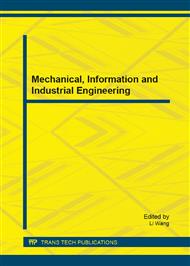p.947
p.952
p.957
p.961
p.966
p.972
p.977
p.981
p.985
Empirical Study on Intelligent Systems Coordination – A Case Study of Intelligent Tourism
Abstract:
Based on the traditional theory of the intelligent systems, as well as the present study on intelligent tourism, Tourist Satisfaction Index model of Intelligent Tourism is put out in this paper. With the data collected in Nanjing, statistic materials suggest that two variables, Perceived Quality of the Intelligent Tourism and Intelligent City, play the most important roles in tourist satisfaction of intelligent tourism. The further analysis reveals that the factor under Perceived Quality of Intelligent Tourism, including Intelligent Transportation, Public Service Platform, Intelligent Hotel and Intelligent Travel Agency, as well as the factors under Intelligent City including Intelligent Governance and Intelligent Environment are the most important factors in the model.
Info:
Periodical:
Pages:
966-971
DOI:
Citation:
Online since:
March 2015
Authors:
Keywords:
Price:
Сopyright:
© 2015 Trans Tech Publications Ltd. All Rights Reserved
Share:
Citation:


